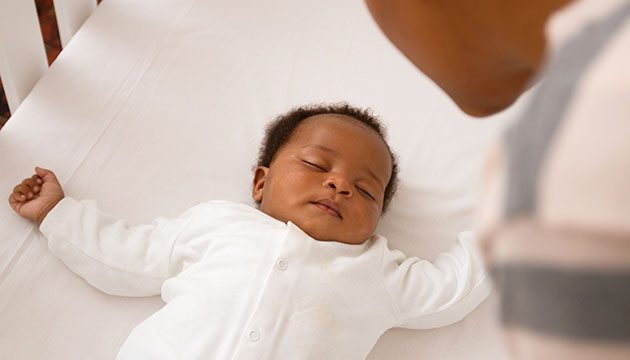Practice safe sleep habits for babies
| Safety | Healthy You

Everyone needs to know the do’s and don’ts of helping babies sleep safely.
Babies—especially newborns—sleep a lot.
In fact, little ones need 14-17 hours of sleep per day in blocks of 2-4 hours, according to the Pediatric Sleep Council.
Because so much of a baby’s first several months are spent in slumber, it is vital to know how to keep these little ones safe as they sleep, said Jennifer Durocher, clinical nurse educator with PeaceHealth St. Joseph Medical Center in Bellingham, Washington.
“And it isn’t just parents who need to know these lifesaving tips—it’s EVERYONE who cares for the baby, be it grandma, nanny, aunt or friend,” she noted.
Safe sleep for babies
Here are some essential do’s and don’ts to keep babies safe during naps and through nights:
- Always lay your baby on his back to sleep. This is particularly important for babies that can’t roll over on their own. “It’s a myth to think that putting the baby on its stomach is better if baby spits up,” Jennifer noted. “The anatomy of the baby’s airway actually is more protected if they're on their back than when they’re on their stomach. On their back, they have less of a chance of choking.”
- Make sure the sleep surface is firm. Couches and other soft surfaces can be dangerous. “Slipping between or under cushions can be a common cause of tragedy,” she said.
- Remove toys and blankets from the crib. Recent research shows that unsafe bedding, such as soft or loose blankets in baby’s sleep area, remains a leading cause of infant death. Keep in mind, little ones don’t have the strength or ability to control their movements and objects around them until they’re much older.
- Keep the temperature of the room cool. You want to avoid overheating, which can make it hard for your baby to breathe.
- Let your baby sleep alone. Sleeping with others in the same bed poses risks of being rolled on or suffocated. It also makes it difficult for your baby’s body to regulate temperature.
- Bring a portable crib when you’re away from home. You want to have peace of mind that your baby’s sleep zone is safe—no matter where you are.
“We want all parents and everyone who takes care of little ones to be aware of safe sleep practices…because those little ones are as important to us now as the day they were delivered at the hospital,” said Jennifer.





